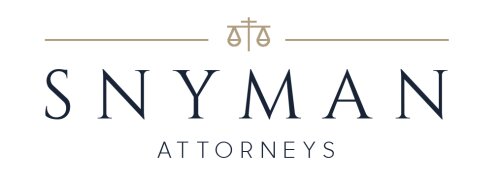Best Collaborative Law Lawyers in Paarl
Share your needs with us, get contacted by law firms.
Free. Takes 2 min.
Free Guide to Hiring a Family Lawyer
List of the best lawyers in Paarl, South Africa
About Collaborative Law in Paarl, South Africa
Collaborative Law is a legal approach widely used in divorce and family law matters, which involves a cooperative and non-adversarial strategy to resolve disputes. In Paarl, South Africa, like in other regions, Collaborative Law focuses on enabling both parties to work together with their lawyers to reach a mutually acceptable settlement. This process aims to reduce the emotional and financial costs typically associated with litigation, promoting constructive communication and negotiation methodologies to benefit both parties, especially in sensitive cases involving children.
Why You May Need a Lawyer
There are several scenarios in which individuals might seek legal assistance through Collaborative Law:
- Divorce or separation: To facilitate a peaceful and structured settlement without resorting to court battles.
- Child custody and support: To collaborate effectively and create a parenting plan that is in the best interest of the children.
- Property and asset division: To ensure a fair and equitable distribution of marital assets and liabilities.
- Spousal support: To negotiate terms that are reasonable and sustainable for both parties.
- Family business disputes: To resolve conflicts that may arise in a family-owned business setting.
Local Laws Overview
South African law provides a framework for divorce and family-related matters through the Divorce Act of 1979, the Children's Act of 2005, and other relevant legislation. In the context of Collaborative Law, it's crucial to understand the following local legal principles:
- The rights of children are paramount; any agreement reached must reflect their best interests.
- There is flexibility in negotiating settlements, provided that both parties consent to the terms and they comply with legal standards.
- Confidentiality is maintained throughout the collaborative process, ensuring that negotiations do not impact future court proceedings if collaboration fails.
Frequently Asked Questions
What is Collaborative Law?
Collaborative Law is a legal process wherein both parties, along with their attorneys, work cooperatively to resolve disputes outside of court.
How does the collaborative process begin?
The process typically begins with each party appointing a trained collaborative lawyer, followed by a series of joint meetings aimed at reaching a settlement agreement.
What are the benefits of choosing Collaborative Law?
Benefits include lower costs, faster resolutions, less emotional stress, and amicable agreements tailored to the unique needs of both parties.
Can all lawyers practice Collaborative Law?
No, lawyers must have specific training in Collaborative Law to effectively guide clients through the process.
Is Collaborative Law legally binding?
Yes, any agreements made during the process can be legally binding once formalized and endorsed by a court, if necessary.
What happens if collaboration fails?
If the collaborative process fails, both parties will need to seek new representation as the participating lawyers are precluded from representing their clients in court thereafter.
Do I need to prepare before engaging in Collaborative Law?
It's helpful to gather all relevant financial documentation and have a clear understanding of your objectives beforehand.
Can I switch to Collaborative Law if my case is already in court?
Yes, if both parties agree to discontinue court proceedings and adopt the collaborative process instead.
What role do collaborative lawyers play?
They provide legal advice, facilitate discussions, and help negotiate agreements in a manner that respects the goals of both parties.
How does confidentiality work in Collaborative Law?
All discussions and documents shared during the collaborative process are confidential and cannot be disclosed in court proceedings.
Additional Resources
Consider reaching out to the following resources for additional support:
- The Law Society of South Africa for finding trained Collaborative Law professionals.
- South African Association of Collaborative Practitioners for more information on the collaborative process.
- Family Mediators Association of the Cape for mediation services if collaboration is not possible.
Next Steps
If you believe Collaborative Law is the right approach for your situation, consider taking the following steps:
- Research and contact local collaborative lawyers in Paarl to schedule consultations.
- Gather necessary documentation and information about your situation to prepare for initial meetings.
- Discuss your goals and concerns with your lawyer to help them understand how best to assist you.
- Commit to the collaborative process with an open mindset focused on resolving conflicts constructively.
Lawzana helps you find the best lawyers and law firms in Paarl through a curated and pre-screened list of qualified legal professionals. Our platform offers rankings and detailed profiles of attorneys and law firms, allowing you to compare based on practice areas, including Collaborative Law, experience, and client feedback.
Each profile includes a description of the firm's areas of practice, client reviews, team members and partners, year of establishment, spoken languages, office locations, contact information, social media presence, and any published articles or resources. Most firms on our platform speak English and are experienced in both local and international legal matters.
Get a quote from top-rated law firms in Paarl, South Africa — quickly, securely, and without unnecessary hassle.
Disclaimer:
The information provided on this page is for general informational purposes only and does not constitute legal advice. While we strive to ensure the accuracy and relevance of the content, legal information may change over time, and interpretations of the law can vary. You should always consult with a qualified legal professional for advice specific to your situation.
We disclaim all liability for actions taken or not taken based on the content of this page. If you believe any information is incorrect or outdated, please contact us, and we will review and update it where appropriate.








